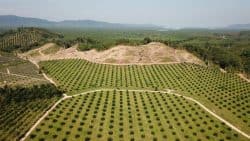A look at the importance of forests, the threats they face and how we can help
Today is World Wildlife Day and this year’s theme is “Forests and Livelihoods: Sustaining People and Planet”, giving us the perfect excuse to talk about something very close to our hearts – forests. Forests are so important for so many reasons, including our own survival as a species, but they’re being cut down at an alarming rate (we’re talking the size of a football pitch every 2 seconds). So, things need to change, and fast. And the best way to start is by being aware of what’s going on in the first place. So, in this blog post, we’re going to explain exactly why forests are so important, the ways in which they’re being threatened, and what we can all do to help (spoiler: this is where recycling comes into it!). Grab a cuppa and have a read…
Why are forests so important?
Answering this question could take up a whole blog post in itself, because there are so many reasons why forests are important. But, for the sake of time, we’ve summarised some of the key ones below:
- Homes – Forests provide a home for 80% of the world’s terrestrial biodiversity (land-based life on earth). Over 50% of all animals on our planet live in rainforests alone and between 200 and 350 million people live within or adjacent to forested areas around the world. That’s a lot of species relying on forests staying put to provide them with the warmth, shelter, water and food they need to survive.
- Livelihoods and everyday life – Whether we live within forests or not, as humans, we all rely heavily on them in so many ways. From fruits, paper and wood to medicines, cosmetics and fuel, forests provide us with an abundance of materials that we often take for granted in everyday life. Accordingly, they also create jobs, with more than 13 million people’s livelihoods dependent upon them.
- Air – After oceans, forests are the largest storehouses of carbon in the world. Trees absorb CO2, storing the carbon within their wood, leaves and soil, and releasing the oxygen back into the air. In doing so, they help us to breathe and fight climate change at the same time, by decreasing the excess amount of CO2 in our atmosphere.
- Water – As well as cleaning the air, trees increase the quality of water. They act like a sponge, collecting rainfall and filtering out pollutants before the water reaches a waterway (such as a stream or river). By collecting rainfall, they also help against flooding, slowing the flow of water and reducing any subsequent soil erosion.
So, why are forests under threat?
Considering they play such a vital role in our world, it doesn’t make sense that forests would be under threat. But they are. And they’re being lost at an alarming rate. In the last 25 years, forests have shrunk by 502,000 square miles, an area bigger than the size of South Africa. So, why is this happening?
- Agriculture – With a growing global population and increased food consumption, many forests have been cut down to make space for farms and plantations, including cattle ranching (for beef), oil palm plantations (for products containing palm oil) and soy plantations (for animal feed). Agricultural production is the number one driver of deforestation worldwide, with 80% of deforestation a result of it.
- Logging – Trees are also being cut down to be sold as timber or pulp. The former is used to make all manner of wood-based products (including furniture, fencing and floorboards) and the latter is used to make paper or paper-based products. To transport the chopped timber, further trees are cut down to enable roads to be built.
- Mining – Mining is another significant cause of deforestation, responsible for approximately 10% of all Amazon deforestation between 2005 and 2015. This is because digging a mine (to find the likes of gold, diamonds or coal) requires the removal of all forest cover and, like logging, needs roads for transportation purposes.
- Urbanization – With the promise of jobs and prosperity, more and more people are moving to cities, so much so that, by 2050, two-thirds of the world’s population are expected to live in urban areas. To cater for this increase, towns and cities are expanding to make space for new infrastructure and homes, and this extra space is often created by cutting down trees.
What’s recycling got to do with all of this?
Recycling is one of the best ways we can all help fight back against deforestation (and we’re not just saying that because we’re recyclers!). So many of the products that come from trees are recyclable. For example, paper can be recycled up to 7 times in total, and cardboard 4-5 times. Choosing to recycle these materials keeps them in use, gets the most out of them as a resource and, importantly, prevents the need to cut down more trees. To put this into stats, if every person in the UK recycled just 10% more paper, we would save approximately 5 million trees each year. And that’s just in the UK.
So, this World Wildlife Day, have a think about all of the products you use (at work, home and when you’re out and about) that originate from trees – do you use these to their fullest? Are there ways you could cut down on how much you use them? And do you recycle them once no longer needed? Thinking about the answers to these questions is the start to making change happen and doing your bit to look after the world’s forests.
If, after reading this blog post, you’d like to have a chat with us about improving your recycling rates, give us a call on 01242 588600 or email us at info@printwaste.co.uk and we’ll be happy to help.


